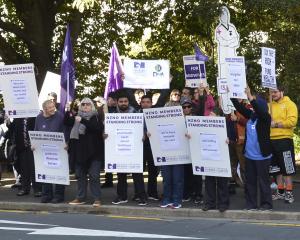Dunedin Hospital's revenue from the Accident Corporation Commission has been $479,000 lower than budget so far this year and next year funding is expected to be more scarce.
Over a full year, the Otago District Health Board has budgeted for $6,850,000 revenue from ACC, and with three months to go only $5,140,000 had been received.
Chief financial officer Robert Mackay-Jones said some $100,000 of the difference was due to a computer glitch where discharge dates had not been recognised under the new computer system and the board had been erroneously claiming for too many bed days.
A further amount, $40,000 to $60,000, related to claims disallowed by ACC because the right approvals had not been obtained by the board.
Mr Mackway-Jones said he expected "cost shifting" from ACC would make more of an impact next financial year.
The board had wanted to introduce part charging for its physiotherapy services last year, when ACC reduced the amount it would pay under its physiotherapy contract, but Health Minister Tony Ryall ruled this out.
Board chief operating officer Vivian Blake said the ACC change in the cost of high technology imaging, such as MRI and CT scans, meant that the board would be doing the same volume but for 20% less money.
It had almost got to the point where the board would have to look at whether it should be providing as much ACC elective work as it did.
When the board had capacity constraints, perhaps doing less ACC work would free up capacity for doing other elective surgery, Mrs Blake said.
Her comments did not relate to urgent or acute ACC work carried out by the board.
Since December, ACC has been progressively lowering the prices paid for providers of some high technology scans, such as MRI and CT, so that by August a 20% reduction will have been achieved.
ACC was concerned both at the cost of scanning, which had risen 120 % in five years, and that it was paying for some scans that were not injury related.








